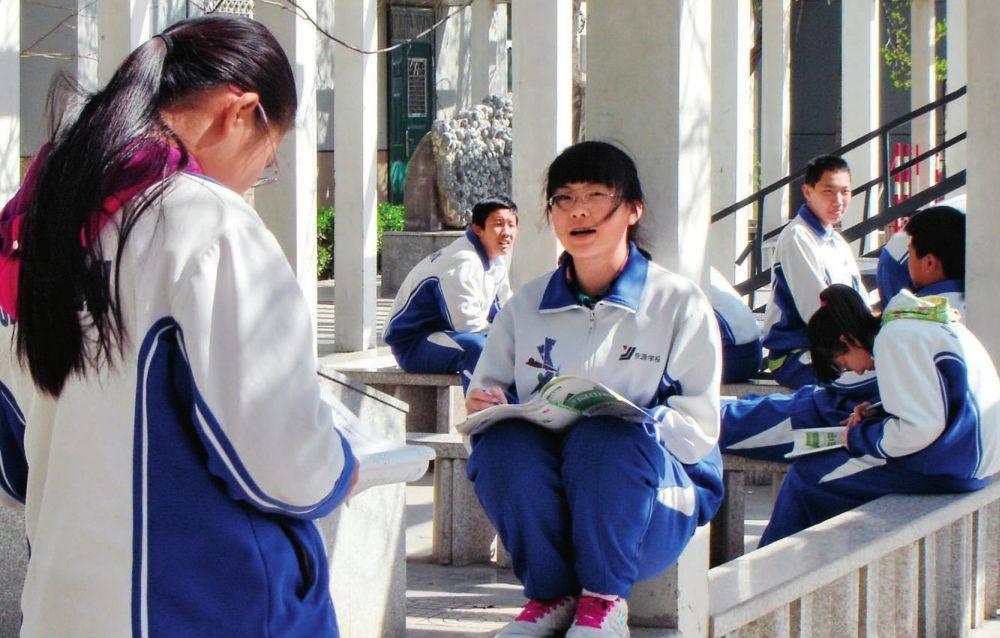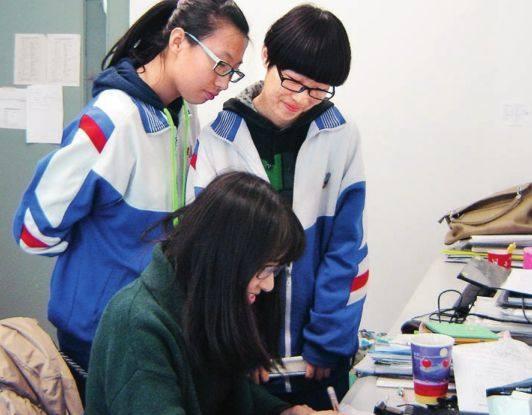Broadening Minds and Worlds in the Classroom
By staff reporter HOU RUILI
THE Chinese education system has received much criticism both at home and abroad for churning out students who only know how to memorize lessons by rote and have little independent ability to solve problems and learn about the world. The general consensus is that change is needed.
Last April, however, William Moore and Robert Neu from Federal Way Public Schools of Washington State and Brian Flannery, Coordinator for Global and Online Education of University of Oregon, visited Beijing Jingyuan School and were shown a different story. Coming out of the building bustling with enthusiastic, inquisitive students and decorated with paintings and calligraphic works inspired by Confucius Analects, their original impression, that the Chinese education was too rigid, changed, and their final verdict was, “Great school.”
Teaching Children to Question
Wang Jue has been a math teacher at Jingyuan School for 12 years and attaches great importance to students previewing a lesson. In the past she just requested her students to get an idea of the basic theories, but she now finds its more helpful to ask them to think of questions to ask when they prepare for class.
Chong Tongwei, a student in her last year of junior high, found this method made her think more analytically about what she was learning. “At the very beginning we took a perfunctory attitude by asking superficial questions like ‘what is the probability mass function for,” she said. “But later we gradually learnt to think about and even question the theories and formulas in textbooks.”
“Students are more active than ever before,” Wang enthused. “Once they came up with 19 different questions that I spent the whole period answering and meanwhile introducing new knowledge. Such a teaching method is more efficient.”
“In the past we just listened to our teacher and finished homework, which was a tedious and boring way of studying; now we come to a class prepared with our own questions and find our own answers with the teachers help. In this way, we have become active learners,” Chong Tongwei said.
The old spoon-feeding teaching method results in students having little ability to learn by themselves. They dont know what or how to learn if they dont have homework to do and dont know how to study independently when they enter university. “After seeing those problems, I started to focus on teaching them reading skills and how to ask questions,” said Wang. Now teachers of other courses have learnt from Wangs experience and adopted her approach.
“One of the reasons that Chinese students consider studying a burden is because they arent emotionally involved in it. If our teachers can make learning an interesting experience for students, it wont become their burden at all,” said Sun Qingya, vice president of Beijing Jingyuan School. “So teachers at our school spare no efforts to stimulate the enthusiasm of students by satisfying their curiosity, thirst for knowledge and desire to express themselves in class.”
Besides encouraging students to ask questions, teachers of Jingyuan School often ask them challenging questions to stimulate their curiosity. Students are encouraged to formulate answers by themselves as an opportunity to show their ability. This gives them a sense of accomplishment and helps them experience the joy of learning.
Independence and Research
Since 2008 Jingyuan School has picked out several highly capable students and given them opportunities to engage in research as part of their studies. Those students are allowed to conduct research projects in university laboratories under the guidance of these institutions tutors.
Since 2008 altogether 72 students have participated in research projects covering a wide range of topics. This means that one tenth of the students at Jingyuan School have participated in various research projects cooperating with five different higher education laboratories.
Shen Guangqian is one of those students. Shen carried out a study on the effect of seepage liquid from garbage disposal factories on soil during her three senior high years. She read extensive college level resources independently and conducted 684 experiments in laboratories that took her more than 1,000 hours. “Doing research taught me how to solve practical problems. Later I found I could apply this experience to resolving many others,” said Shen. Her newfound ability to tackle problems won her first place in the college entrance exam for her district in Beijing and a place at Peking University, one of Chinas top universities.
“There is no conflict between cultivating the overall ability of a student and achieving good scores in tests,” said Sun Qingya. “We pursue an education that make students perform well in exams, as well as develop a comprehensive ability. We understand that we should respect students individuality and that it is harmful to develop an exam-focused education.”
Although Shen focused on chemistry research during high school, her ambitions werent so focused and she chose to study medicine at university. “Students have a limited field of vision if they only focus on textbook learning. But a broadened view is helpful for promoting students study in class,” said Sun Qingya. “Research shows that non-intellectual elements such as vision and values provide incentives for students development. Moreover, participating in various programs such as conducting research teaches students how to organize their time. In todays fast-paced life, the ability to allocate time is essential.”
A Positive Outlook on Life
“Teachers are busier than ever before. When I entered Jingyuan School, my task was only to teach my subject and discipline my students,” Wang recalled.“Now my tasks have been widened to take care of students campus life and help them cultivate their comprehensive ability, and in particular to help them form a positive outlook on life.”
Nowadays most middle school students, being the main focus of their parents attention and resources,are spoilt and have limited understanding of teamwork. Therefore, Wang tries to teach them the value of sharing.
As part of this, Wang insists that her charges join her in cleaning the classroom. At first some children didnt even know how to sweep a floor, but gradually began to enjoy such chores and discover the satisfaction they could get from labor. “We need to teach students to care about others so they can become happy and warmhearted people,” Wang said. In May of last year, volunteers from Wangs class went to a center for autistic children to read them stories and play games with them. They donated their toys and books to those children. On top of that, the students also put on a performance and benefit sale, raising RMB 2468.75 for the center.
Jingyuan School also organizes a letter writing activity for the schools 14-year-olds who are about to have their coming-of-age ceremony. During the activity students and their parents are encouraged to write letters to each other, and the project inspires them to be more appreciative of their parents and grateful to them.
Weng Juntian, a teacher in charge of Class 3 in the first senior high year, took her students to visit Xu Fengxiang, who worked in Tibet for many years engaged in ecological research, to spend time with senior citizens living in rest homes, and to talk to juvenile offenders in a correctional institution. Weng said the visits help students think about life, with all its highs and lows, and learn about the thoughts and experiences of others who make up society.
Going Out into the World
Extracurricular activities arent just those designed to teach students how to work and organize themselves independently or be responsible members of society. The school also runs trips to broaden students cultural horizons, taking them to museums, theaters and music venues. Wang Jue organizes trips every month and thinks hard about how to make students experiences of these activities more enriching.
Before going to the Forbidden City, the students were given a thorough background to the imperial palace; a geography teacher explained why its location was chosen, a history teacher discussed the changing dynasties and an art teacher introduced the decorations incorporated into its architecture. Furthermore, experts from Beijing Normal University were invited to tell them about the history and architecture of the palaces as well as royal family etiquette.
To top it off, Wang showed them a documentary about the Forbidden City, and arranged for the schools librarians to show students how to find materials from the library and on the Internet, and how to make e-books. The students were given one month to prepare a topic about the ancient seat of imperial power. Topics they chose included the unique features of blue-and-white porcelain in the Forbidden City, the “cold palace,” fire prevention, the animal carvings that adorn the roofs of its buildings, and heating and flood control.
According to those topics, the students formed groups and visited the Forbidden City. They were not simply visitors. They took photos and interviewed staff and tour guides to find answers to their questions that were eventually presented to an engaged group of teachers and fellow students.
“The important thing about this extracurricular activity is not the results, but the process of doing research and understanding its methods. Teachers like us help them learn to study, think and explore. The presentations help them practice expressing themselves,” Wang explained.
Bringing the Real World Inside
In the past three years, teachers at Jingyuan School have tried to transform the current trends and hot topics in society into educational resources by asking students to do their own research.
After the earthquake that damaged the Fukushima nuclear power plant struck Japan two years ago, the school held a forum themed on “Harmony between Man and Nature.” Students were asked to collect materials and teachers gave lectures and guided students in giving their own presentations. Students were also given earthquake safety drills.
“Whenever a big issue arieses, it draws the attention of the whole world, including our students,”Sun Qingya said. “And its easier for students to collect relevant materials as it happens, so broadening their views.” There have been many such forums held in school, covering everything from Steve Jobsdeath, territorial disputes in the South China Sea and Chinas space missions.
“Students in Western countries are eager to show themselves,” said Cheng Yu, who himself gave a speech at a forum titled “Understanding the Charm of London through the London Olympics.” “But most Chinese students are more reserved and shy. By participating in forums and other activities such as singing competitions and student companies we can practice expressing ourselves.”
The four student companies at Jingyuan School, one of which Cheng Yu was elected as CEO, encourage students enterprising spirits. Cheng Yus company organized an activity selling plants on this years Earth Day, and her next venture is to publish a school journal in a bid to earn profits in the student market.
The student company program was launched in 2011 in cooperation with the U.S.-based Junior Achievement (JA), a non-profit organization that works with students through a practical curriculum administered by trained classroom volunteers. The program is an elective course and gains the students involved course credits. But more importantly, it teaches them to work together to develop strategies and manage companies by themselves, help them understand the business world and the market economy, and cultivate their creativity and analytical and teamworking abilities.
“Traditional class education only teaches students concepts without experience,” Sun Qingya concluded.“We need to encourage children to apply what they have learned from books to real life.”

